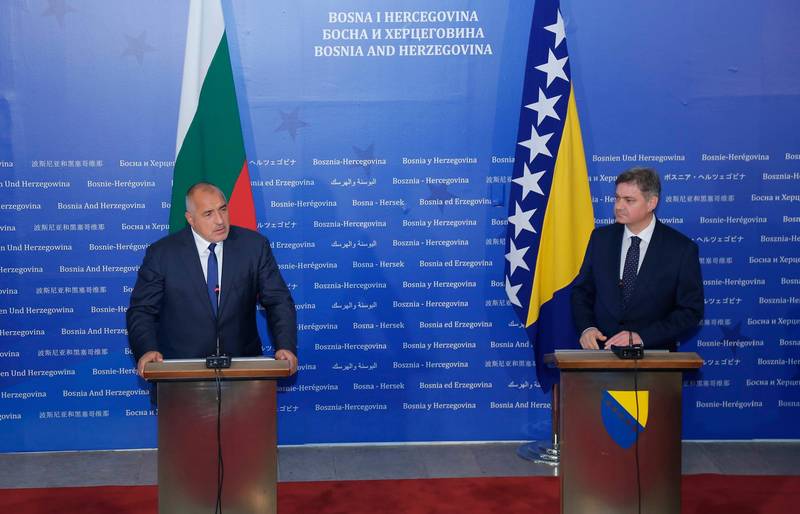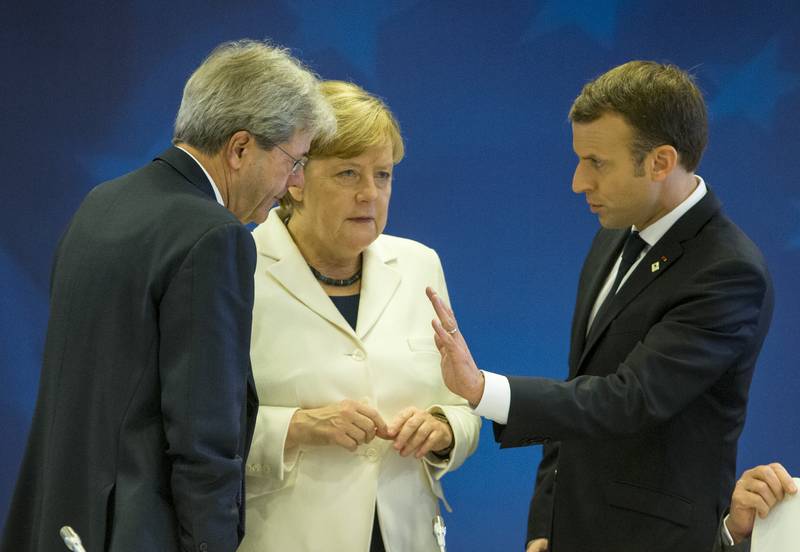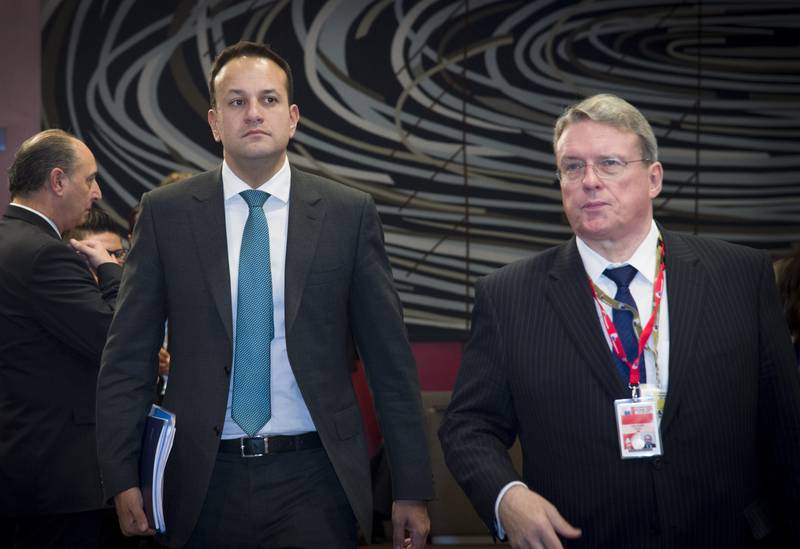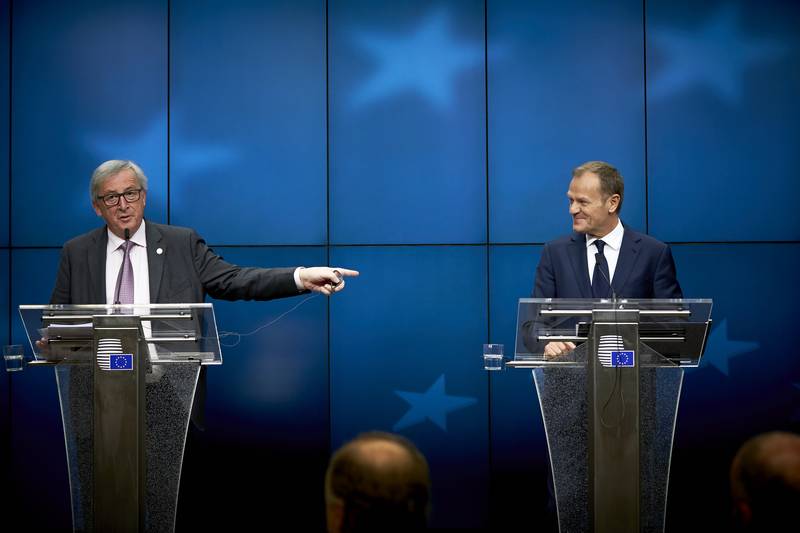Sofia Wants To Be Thessalonнki II but It Lacks Substance and Momentum
Adelina Marini, October 31, 2017
 The Western Balkans will be a central priority of the Bulgarian EU Council presidency, which starts on January 1st. This is both a very good and a very bad piece of news. Very good because this region is strategically very important for the Union. Very bad because the subject is too big a spoon for the Bulgarian mouth. The big event of 2018 will be the mega summit EU-Western Balkans in Sofia. On May 17, the leaders of the 28 EU member states and of the six Western Balkan countries will gather together in the Bulgarian capital. This was confirmed in the leaders' agenda which European Council President Donald Rusk (Poland, EPP) proposed at the autumn EU summit and was approved unanimously. The ambition of the Bulgarian presidency is the May summit to provide the region with a new perspective for its European integration.
The Western Balkans will be a central priority of the Bulgarian EU Council presidency, which starts on January 1st. This is both a very good and a very bad piece of news. Very good because this region is strategically very important for the Union. Very bad because the subject is too big a spoon for the Bulgarian mouth. The big event of 2018 will be the mega summit EU-Western Balkans in Sofia. On May 17, the leaders of the 28 EU member states and of the six Western Balkan countries will gather together in the Bulgarian capital. This was confirmed in the leaders' agenda which European Council President Donald Rusk (Poland, EPP) proposed at the autumn EU summit and was approved unanimously. The ambition of the Bulgarian presidency is the May summit to provide the region with a new perspective for its European integration.
From Thessalonнki to Sofia
Such a huge event related to the Balkans' European future has not taken place since 2003 when the Thessalonнki agenda was agreed, the main objective of which was to state loud and clear that the future of the countries in the region belongs to the EU. The approved tasks back then, alas, continue to be quite topical 14 years later, and those are: continue the consolidation of peace, stability and democratic development; progress in the European integration; fight against organised crime; economic development; reconciliation and strengthening of regional cooperation. In the agenda, a special emphasis is put on the inviolability of international borders, seeking peaceful solution to conflicts, fight against terrorism, violence and extremism no matter if it is ethnically, politically or criminally motivated.
Fourteen years ago, the EU stated clearly that it supports activities and initiatives in the region that boost social cohesion, ethnic and religious tolerance, multiculturalism, return of refugees and displaced persons, fight against regressive nationalism. After the adoption of the agenda, the leaders of the member states adopted conclusions which stated that the aspiring countries are expected to share the European values of democracy, rule of law, respect for human and minority rights, solidarity and market economy, "fully aware that they constitute the very foundations of the European Union".
The then EU leaders hardly suspected that this issue would not only remain painfully topical for the Western Balkans but for some new EU members, who only 2 months before the adoption of the Thessalonнki agenda had signed their accession treaties. They hardly expected that the Union would be flooded by Euroscepticism, which led to the first ever exit of a member state. Nevertheless, they prophetically underlined in their Thessalonнki conclusions that the countries from the region are expected to "fully share the objectives of economic and political union" and to support the creation of a stronger Union.
Today, 14 years later, the situation in the Balkans is both different and the same. Different because the political geography has changed - Slovenia, Croatia, Bulgaria and Romania are now members of the EU; Serbia and Montenegro are actively negotiating their membership; and Macedonia only has a candidate status but does not negotiate. Bosnia and Herzegovina is in a process of filling the European Commission's questionnaire, which is the first step toward receiving a candidate status and Albania hopes to receive such a status. In the mean time, Kosovo is already an independent state which, however, is not recognised by five EU member states, but the Union facilitates a dialogue for normalisation of relations between Belgrade and Pristina, which is part of Serbia's accession process.
After Thessalonнki, the EU thought that the ambition of the countries in the region was irreversible and that is why it took a position of waiting for them to do their part of the work. This has proved to be a wrong approach which dumped the region in a continuous deadlock and created a fertile ground for a renewal of hostilities among the countries in the region. Currently, relations between the former room-mates in ex-Yugoslavia are at their worst condition since the end of the wars, which forced the EU to urgently start looking for ways to "return" to the region, which is a sphere of interest for big and not quite friendly geopolitical players too. Macedonia turned from a champion in 2005 to a captured state, threatened by an ethnic conflict. Bosnia and Herzegovina is again fragile with growing inter-ethnic tensions and calls for secession of the Serb entity.
Serbia is still hesitating whether it really wants to be part of the EU, trying to play the Russian card as well. To many in the EU, President Aleksandar Vucic is a pro-European leader, but this is only in words. In terms of actions, he is another one who chose the illiberal path. In the country, a process of rehabilitation of the Milosevic regime is taking place, nationalism is again in fashion in almost all the countries in the region, the rule of law is an incomprehensible concept which looks more and more impossible to plant, democracy is perceived by the local elites as a tool to consolidate power and crush opposition, progress in the European integration is only measured by the opening of chapters, and the accession process is politicised more than ever by the EU itself. In other words, the Western Balkans are a combustible region again, which needs a restitution of the Thessalonнki spirit, hoping that the effect it had back then will be repeated.
The Western Balkans are too big a bite for the Bulgarian mouth
Against this background, Bulgaria, not very reluctantly and under pressure from Germany, took the ambition to put the region under the spotlight of the EU. Each Council presidency has to have a priority of its own. Estonian presidency, for example, is focused on digital economy because Estonia is a digital champion and is known worldwide with the nickname E-stonia. Bulgaria does not have much to boast with in addition to the fact that it is blocked from further integration in the euro area and Schengen by its systemic problems with justice and the rule of law in general. Ten years after its EU accession, Bulgaria is still under special monitoring.
Germany's motivation, as well as that of other countries, for which the region is very important, is that Bulgaria is part of it and it is presumed it has experience. The problem is, however, that the country has been very passive for decades in this region. Its external policy toward it is reduced to stating support for its European integration. Through the years, Bulgaria turned from an unconditional supporter of Macedonia's European integration (whose independence the country was first to recognise) into another veto for its membership, putting as pre-condition the signing of a friendship agreement.
Bulgaria is not even a member of the Berlin process - the initiative of German Chancellor Angela Merkel for economic support for the region. According to well informed sources euinside spoke with, the logic of the Bulgarian diplomacy has so far been that there are two types of countries that participate in the Berlin process - donors and beneficiaries. Bulgaria neither has anything to give nor does it have anything to take, which is why it was decided to stay away. Because of the lack of serious initiatives in the region and notable presence Bulgaria is starting from a position of any other country which is not a geographical part of it.
Bulgaria only this year started trying to position itself in the region, but is doing this with a leader who is dangerously ignorant when it comes to fundamental issues of its history. The Western Balkans are in his mouth on a daily basis, but this could be as harmful as it could be useful. He is not even aware of the basic terminology for the region, which is of major importance for the messages that will be conveyed not simply by Sofia, but by the upcoming Council presidency of the EU. For example, he uses the word "package" having in mind something completely different, without taking care what a dangerous meaning it has in the context of enlargement.
In the beginning of October, Bulgaria hosted a quadrilateral summit in Evksinograd with the prime ministers of Greece, Romania and the president of Serbia. The fact that only Serbia was invited led to speculation that a Balkan four is emerging (following the example of the Visegrad four) - something Mr Borissov was quick to deny. He underscored that what brings the four leaders together is their interests in infrastructure. Borissov half-heartedly added that the format was open for the other countries in the region too - Albania, Montenegro, Macedonia - depending on the projects. The fact that he met with some and not with others is already noticed in the region. During the autumn European Council in Brussels on October 19-20 Boyko Borissov said, without being asked, that his Croatian counterpart Andrej Plenkovic asked him why does he not invite him. "And I tell him, just wait for those who are lagging behind first and then we will join", Borissov said he told Mr Plenkovic.
The Evksinograd summit had a very bad timing too - it took place just two days after the bloody clashes in Catalonia, which strongly reminded of the Kosovo situation in the beginning of the 1990s. Despite the similarities though, Kosovo is not Catalonia and Serbia is not Spain. But to Belgrade this is a door to try and get rid of chapter 35 which covers relations with Kosovo and will be closed last. Another problem is that two of the countries whose leaders were present at the summit - Greece and Romania - have not recognised Kosovo but Bulgaria has. In such an environment, Borissov left Aleksandar Vucic to make his wrong and well known claim about the double standards the EU applies to Kosovo and Catalonia.
Wrong because the Kosovo independence was possible after Slobodan Milosevic started massive ethnic cleansing in the province which led to NATO's intervention. The Catalan case is completely different - there is no ethnic cleansing nor repressions, which makes Serbia's claim unjustified. The Bulgarian prime minister's lack of good background is a pre-condition for such gaffes to happen in the future as well. And it was not necessary to wait long. Last week, the premier made several gaffes during his official visit in Sarajevo.
 During a joint presser with Bosnia and Herzegovina's Prime Minister Denis Zvizdic, Mr Borissov said that the Western Balkans will be a main priority for a series of presidencies. After the Bulgarian one comes the presidency of Austria, he said, and as if for consolation he recalled that Austria was here before during the Austro-Hungarian empire. Words that do not sound well in a city where the Austrian Archduke Franz Ferdinand was assassinated on 28 June 1914, which marked the beginning of World War I. In an attempt to explain how stupid the historical disputes are and the conflicts based on them, Borissov asked what would happen if Bulgaria went on to remember about its territories during Tsar Simeon's reign.
During a joint presser with Bosnia and Herzegovina's Prime Minister Denis Zvizdic, Mr Borissov said that the Western Balkans will be a main priority for a series of presidencies. After the Bulgarian one comes the presidency of Austria, he said, and as if for consolation he recalled that Austria was here before during the Austro-Hungarian empire. Words that do not sound well in a city where the Austrian Archduke Franz Ferdinand was assassinated on 28 June 1914, which marked the beginning of World War I. In an attempt to explain how stupid the historical disputes are and the conflicts based on them, Borissov asked what would happen if Bulgaria went on to remember about its territories during Tsar Simeon's reign.
The Bulgarian prime minister's ignorance is to some extent compensated by the fact that he truly understands how important it is to work with the Western Balkan countries. The problem is that he has no idea what to do. The quick agreement of the friendship agreement with the new Macedonian government is an excellent example of de-blocking of long lasting problems in the region. It could serve as a boost for lifting the Greek veto over Macedonia's negotiations process and is an example of constructivism and will for regional cooperation for the rest of the region.
For the docile a date, for the naughties a horizon
Given the complicated situation in the Western Balkans, the strong geopolitical element included, the Bulgarian presidency will be a walk in a mine field with its central priority. The ambition of the presidency is the countries of the region to receive a clear commitment in Sofia on May 17. The more advanced countries in the negotiations process, like Montenegro for example, could get a concrete date for accession, whereas the rest could receive a timeframe of around 4-5 years. To Macedonia it will be a success if it receives a green light to start negotiations. Albania expects to receive a candidate status.
Bulgaria also wants to inject some practical contribution to the summit, which will be a difficult task because the Bulgarian presidency has to avoid duplicating the Berlin process. Prime Minster Boyko Borissov said he wants a significant increase of the pre-accession funds for the region. To him the significance of the May summit is "now or never". "I feel that everyone realises that the Balkans are a place which, if we do not invest attention, including in terms of European projects or common accession projects, we will lose them. I feel in all colleagues an interest and I'm an optimist in this direction. Undoubtedly, this is the poorest region", he said after the European Council meeting in October. His desire is Sofia to break a news, the summit to give a real perspective for the region not just end up as another protocol event.
Reefs for the Sofia summit
The situation in which the EU finds itself, the Western Balkans as well, is completely different compared to 2003. The Union is on its way to make a great jump in the deepening of its integration, but it's no longer that united as it was 14 years ago. A multi speed Europe is no longer a taboo but a real perspective, created by the retreat of some new member states from the European system of values. That is why, it will be important the Sofia conclusions to include the text from 2003 which demands a pledge by the countries of the region to this system. Not less important is to invite these countries say what a Union they want to join - a more integrated one or a looser community.
This could give the Union an idea what can be expected of them after accession, although by the time they join governments will change and probably attitudes. The answer to this question can also hint at what compromises can be made with them.
Regional relations are a dangerous reef. This issue should be approached with care, especially against the backdrop of the developments in Catalonia which, at this stage, show that they could have an impact on the Belgrade-Pristina dialogue. Normalisation of relations between Kosovo and Serbia is included in a separate chapter of the negotiations with Serbia and certainly it will be a major obstacle for its accession, unless a solution to Kosovo's status is found. Such a solution would also demand the EU to resolve the issue with non-recognition of Kosovo by five of its members - Romania, Spain, Slovakia, Cyprus and Greece.
Bulgaria will make a mistake if it relies only on its own self and its too weak capacity for the Western Balkans. The success of the summit in Sofia will be difficult but real if it is prepared jointly with the fellow member states from the region, like Croatia, Greece, Romania, and the direct involvement of the European Commission, High Representative Federica Mogherini (Italy, S&D) and the European Parliament rapporteurs for the countries in the region. The Western Balkans are too important to be left in the hands of a single presidency. Boyko Borissov hopes the issue will remain in the spotlight of the Union because of a series of committed presidencies. What about after? The Sofia summit has to answer this question too.
 Gentiloni, Merkel, Macron | © Council of the EU
Gentiloni, Merkel, Macron | © Council of the EU Leo Varadkar | © Council of the EU
Leo Varadkar | © Council of the EU Jean-Claude Juncker | © Council of the EU
Jean-Claude Juncker | © Council of the EU Bakir Izetbegovic, Andrej Plenkovic | © Council of the EU
Bakir Izetbegovic, Andrej Plenkovic | © Council of the EU Aleksandar Vucic, Recep Tayyip Erdogan | © Serbian Presidency
Aleksandar Vucic, Recep Tayyip Erdogan | © Serbian Presidency Jean-Claude Juncker, Zoran Zaev | © European Commission
Jean-Claude Juncker, Zoran Zaev | © European Commission